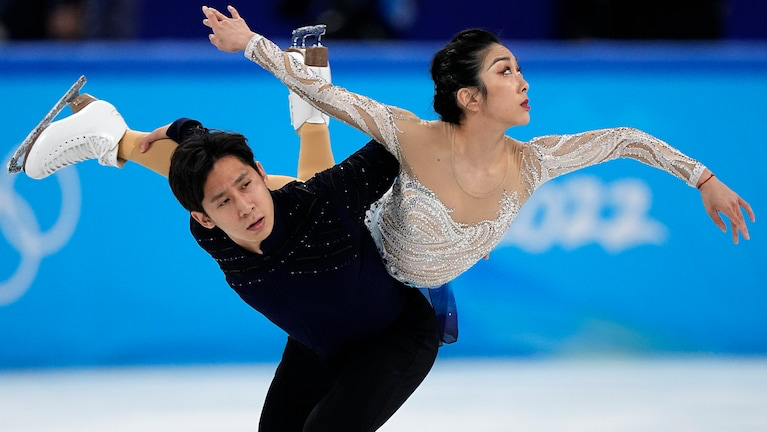Published: February 20,2022
By staff writer

China’s Sui Wenjing and Han Cong skate to gold in the pairs program. “We realized our dreams in our homeland,” Han said. (David J. Phillip/AP)
The 2022 Winter Olympic Games are closing today, and have been the most-watched Winter Games ever, according to data from the International Olympic Committee. Chinese athletes won a total of nine gold medals, four silvers and two bronzes, considered asthe best results in the history of China’s participation in the Winter Olympics.
The Communist Party of China (CPC) Central Committee and China’s State Council congratulated the Chinese delegation for its “best in history” performance at the Beijing 2022 Olympic Winter Games.
In his address before the opening of the Beijing Winter Olympics, President Xi Jinping promised that China would do its best to deliver a “streamlined, safe and splendid games.” As the games come to a close, any fair judge would say the country has lived up to that promise. But it would not be the Olympics, if there were no controversies, and so it has been with Beijing 2022.
As the closing ceremony begins, there will be much to celebrate, for both the athletes and the host nation.
In spite of much carping from the world’s media, the country will have managed to host a major sporting event, the Olympics, no less, in the middle of a pandemic. And they will have done so maintaining their “zero Covid” policy, where even a single case, leads to automatic tightening of preventive measures, until testing and tracing, confirms that the outbreak has been contained.
The policy has come under sustained criticism from the western world, for which “living with Covid” means accepting a degree of infection, knowing that deaths may result from that.
With a population of over a billion, China decided from the outset, that they could not afford that kind of laxity, if they were to avoid loss of life, in the millions. And the policy has delivered the desired results, with China now the only country to have truly contained the virus.
And there would be no let up to the Zero Covidpolicy, when it came to the Olympics, in spite of siren voices from all quarters, calling for a relaxation of restrictions.
Athletes, and their entire support systems, have performed within a “closed loop” a type of bubble, in which they would live until their return home.
And it is within this bubble, that the drama of the Olympics has played out. There was the unintended battle of the generations, with Russia’s KamilaValieva, China’s Eileen Gu, and Germany’s ClaudiPechstein, all throwing down challenges to other athletes, present and future.
Figure Skater, Kamila Valieva, was one of the sensations at these Winter games. And by the end of her first performance, it all went according to the form book. The fifteen year old did what no other woman had done before at the Olympics, the quad jump. From then on, it seemed as if all other athletes in her discipline might have to be content with competing for silver and bronze medals.
It would require particular genius to conceive of a way to adequately explain to the rest of us, the difficulty involved in jumping a quad. Neither the imagination, nor an especially vivid dream, seems enough to approximate what it takes to leap in the air, spin around four times, at unnaturally high speed, and land on one leg, a few seconds later.
And if you are Kamila Valieva, to lift off again, and follow it up with another improbable leap, and agraceful landing, the margin for error, infinitely thinner than the blades on which she comes down.
But then, it all went pair shaped, thanks to the adults, who were supposed to look after her welfare, and through whom she was robbed of her rightful moment to represent the Olympic spirit.
It was found that she had failed a test, for a performance enhancing drug, almost certainly ingested without her knowledge.
Nonetheless, the Olympic committee controversially, allowed her to continue competing, citing her age.
But it clearly all became too much for her, and she was unable to recover the composure to perform at her own impossibly high standards. Her treatment,after falling to fourth, earned her coach, and the rest of her team, a rare rebuke, from the International Olympic Committee chief, Thomas Bach, who called it “chilling.”
At fifteen, Valieva will have plenty of time to recover from her ordeal, and with the right people aroundher, come back stronger, for the next Olympics.
If Valieva’s Olympics turned into the stuff of nightmares for her, another teenager, Eileen Gu, was living her Olympic dream, in her own words, “living my best life.”
The eighteen year old, was born in San Francisco, to a Chinese mother and American father. She could have been a star performer on either Team USA, or Team China, she chose China.
True to her discipline, the freestyle skier seems toembrace pressure, even deciding to attempt, and pulloff a skill she had not practised, before the competition.
It is an insouciance that enabled her to be the first action sports athlete to win three medals at an Olympics. And they could all have been gold. The two silver positions missed the top spot by the tiniest of margins.
Against all the best efforts of the adults to once again, bust a young Olympian’s bubble, this athlete continued to fly high.
When China rightly, and understandably, took her to their hearts and celebrated her, some American media carped that she was used for propaganda. Fox News snarled that the athlete was “ungrateful” for choosing to represent China, and that her “reverse migration” was “shameful.”
In a world that was not so perverse, Gu would be universally regarded as an embodiment of what the Olympics are supposed to be about, uniting two cultures, that certainly need bringing together.Instead, she found herself having to stand firm, against those who sought to divide, where she would unite.
While the teenagers stole much of the limelight, the older athletes were not to be overshadowed.
At 49 years, 348 days, German speed skater, Claudia Pechstein, became the oldest woman to compete at the Olympics. She was however unable to prevent Irene Schouten of the Netherlands, from breaking her 5,000 metres record. Schouten would go on to break the 3000 metre record, also set by Pechstein.
Not to be outdone, 34 year old Natalie Geisenberger, considered one of the greatest lugers, added to her lustre, by becoming the only woman to win gold in singles, three times.
America’s gold drought in speed skating was broken by Erin Jackson’s win in 500 metres, becoming the first black woman to win gold at the Winter Olympics.
When the snow dust settles, the Beijing Winter games, are likely to be judged to have been indeed a splendid games, not least for achieving the difficult feat of organising that streamlined, safe, games in the midst of a pandemic.
 Africa -China Review Africa -China Cooperation and Transformation
Africa -China Review Africa -China Cooperation and Transformation
